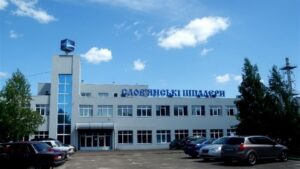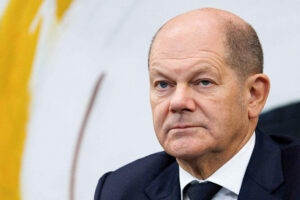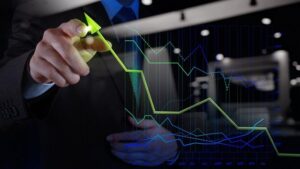
Slavic Wallpaper-KFTP JSC (Koryukivka, Chernihiv region), a leading Ukrainian wallpaper manufacturer, produced 16.39 million conventional pieces of wallpaper in 2024, up 1.4% from 2023.
According to statistics provided by UkrPapir Association to Interfax-Ukraine, the company maintained a small increase in production at the end of the year, which gradually slowed down over the course of the year, with growth of 18-20% in the first months.
At the same time, in monetary terms, the factory’s production volume decreased slightly last year to UAH 1 billion 246 million.
In December, the company produced 1.02 million conventional pieces of wallpaper, which is 9.7% less than in December 2023 and 22.4% less than in November last year.
The Association does not have data on the total production of wallpaper in Ukraine in 2024, as the State Statistics Service has stopped providing it.
JSC Slavic Wallpaper-KFTP produces more than 10 types of wallpaper from the economy segment (paper, duplex, acrylic) to premium wallpaper (vinyl, non-woven, hot stamped), as well as its own latex, water-dispersion paint under the Latex brand.
As reported, in 2023, Slavic Wallpapers-KFTP increased its wallpaper production by 19% compared to 2022, to 16.2 million units, production increased by 38.2% to UAH 1 billion 249 million, and net profit increased almost eightfold to UAH 47.7 million.
Earlier, the company noted that sales volumes, especially through retail channels, had dropped significantly as a result of Russian aggression.

As of January 15, Ukraine exported 23.616 mln tonnes of grains and pulses since the beginning of the 2024-2025 marketing year (July 2024 – June 2025), of which 1.388 mln tonnes were shipped this month, the press service of the Ministry of Agrarian Policy and Food reported, citing the data of the State Customs Service of Ukraine.
According to the report, as of the same date last year, the total shipments amounted to 20.563 million tons, including 2.097 million tons in January.
In terms of crops, since the beginning of the current season, Ukraine has exported 10.326 million tons of wheat (413 thousand tons in January), 2.008 million tons of barley (9 thousand tons), 10.8 thousand tons of rye (0), and 10.868 million tons of corn (959 thousand tons).
The total export of Ukrainian flour since the beginning of the season as of January 15 is estimated at 39.4 thsd tonnes (1.8 thsd tonnes in January), including 36.1 thsd tonnes of wheat (1.6 thsd tonnes).

Federal Chancellor Olaf Scholz (SPD) only wants to approve additional arms deliveries to Ukraine for three billion euros before the federal election even if they are financed by suspending the debt brake. The help is only possible via a separate borrowing, “because otherwise the money is not there,” he said in an RTL interview.
Scholz had already made this proposal in the traffic light negotiations on the 2025 budget, where the coalition was ultimately broken. “I would decide even now that if everyone joins in a decision: we finance it extra through loans.” But then “some would have to jump over their shadow,” said the chancellor. Anyone who does not want to say where the missing means should come from. Scholz estimated the hole in the not yet adopted budget at 26 billion euros by 2025.
In an interview with the “Westphalian News” and the “Westphalia leaf” specified Scholz, even if you asquire that everything money is not spent in the course of the year, there is probably a gap in cover of at least 16 billion euros. “If we want to decide on another three billion euros for bilateral arms aid for Ukraine, it would be an uncovered check.”
The FDP head and former finance minister Christian Lindner excludes a suspension of the debt brake. He wants to finance aid for Ukraine and the Greens through a “unscheduled edition”. However, according to Article 112 of the Basic Law, this would only be possible under certain conditions. “It may only be granted in the event of an unforeseen and irreplaintated need.” An example of such an issue was instant aid for flood victims in 2013 after severe flooding in parts of Germany.
Source: https://www.zeit.de/news/2025-01/15/scholz-will-ukraine-milliarden-nur-ueber-schulden-finanzieren

Prices for policies of compulsory insurance of motor civil liability of owners of land vehicles (“autograzhdanka”, OSAGO) after the entry into force of the new law from January 1, 2025, increased on average from 70% to 100%, according to a survey of leading insurance companies in this market, conducted by the news agency “Interfax-Ukraine”.
Thus, according to the advisor to the head of the board of directors of Oranta Elena Mashara, the cost of “auto insurance” both in the company and in the market as a whole has increased on average by 80-90% compared to the previous year. However, if we take into account policies with zero deductible, the increase in insurance payments is about 50%.
At the same time, she emphasized that this growth is not uniform, because now insurers have the opportunity to segment the market more flexibly and in more detail than before, when there was price regulation. For example, at Oranta, the loss ratio of MTPL contracts concluded for electric cars was several times higher than for other types of vehicles. As a consequence, the increase in the cost of insurance payments for this segment is more significant than for other types of vehicles.
In IC “European Insurance Alliance” the cost of “auto insurance” has increased from 70% to 110% and is determined depending on the type of car, place of registration (residence) of the owner of the vehicle (TC), notes the head of the product management department of motor risks of the company Vitaly Bazik.
In IC VUSO this growth amounted to 80-100% that is caused by weighty changes in insurance conditions, in particular by significant increase of insurance limits for payments to victims.
“New limits allow to provide our clients with essentially greater protection in case of road traffic accident, covering losses, which earlier could exceed the limits of the previous amount of coverage”, – noted in the company.
In turn, in IC “Express Insurance” indicated that the cost of their MTPL policies increased by an average of 70-75%, which is due to the new requirements of the legislation, providing for an increase in the sums insured for life and health – from 320 thousand to 500 thousand UAH, for property – from 160 thousand UAH to 250 thousand UAH, the abolition of depreciation for car repair, deductible and limit on the europrotocol.
According to ARX IC, it makes no sense to compare the prices of the old “car insurance” (before the legislation was updated – IF-U) and the new one – they are completely different products in terms of content. It is like comparing a parcel train and an airplane, because the terms of settlement have changed, reimbursement of the cost of parts and components of the car will be made without deduction of depreciation, and all insurers-participants should join the direct settlement, the company explains. At the same time, the insurer specified that in general the cost of its policy varies in the range of 3500-6000 UAH depending on the age of the driver and the vehicle, as well as on the type of car and the region of registration.
As for the average price for this insurance, in IC “Express Insurance” for passenger cars with engine volume up to 1600 cm³ the price of MTPL policies ranges from 2200-5600 UAH.
“We will continue to analyze the dynamics of loss adjustment costs and, if necessary, to adjust tariffs for certain categories of clients”, – stressed in the company.
In IC ARX the cost of “auto insurance” for the car B1 1988 year of manufacture, Kiev, the age of the owner 50-55 years is 3243 UAH (minimum), and for the car B4 2020 year of manufacture, Kiev, the age of the owner 18-22 years – 12 771 UAH (maximum). At the same time, the average payment on policies, concluded under the new conditions, for the first ten-day period of January is UAH 3,520.
According to the data of IC VUSO, their average cost of MTPL insurance policy is now about 4000 UAH. As for the minimum price, it is 500 UAH for a vehicle of the type “motorcycle” and 50 thousand for a bus registered in Kiev.
According to Mashara, for the first days of 2025, the average cost of “auto insurance” in “Oranta” amounted to 2375 UAH, which is slightly lower than the initial expectations of the company.
“This is due to the fact that a new segment of customers joined the insurance market – participants in hostilities and other preferential categories of car owners, previously had the right not to conclude contracts of MTPL. Until 2025, the consequences of road accidents involving them were compensated by the MTSBU Victims Protection Fund, and now, according to the new law “On MTPL insurance”, such persons must conclude insurance contracts with a discount of 50% of the insurance payment”, – said the expert.
At the same time, she emphasized that currently almost 5 thousand contracts with new clients have already been concluded, and the average cost of a discounted policy is 1440 UAH.
Answering the question of what most affects the price, all companies noted that it is the type of vehicle (passenger car, electric car, truck, bus, etc.) and its subtype (engine volume, load capacity), the sphere of use (providing paid transportation services or not), the term of the insurance contract and whether the policyholder has the right to a benefit. An important factor is the region of vehicle operation: in cities with high traffic intensity, such as Kiev, premiums are much higher than in quieter regions. In addition, now insurers have begun to more actively take into account the age and length of service of drivers authorized to drive the vehicle, the nature of car operation.
In ARX added that the company has long introduced an additional coefficient.
“For example, we have a driver of 45-50 years will get a completely different price than a driver who is 18 years old, even if they have the same brand of car in Kiev,” – explained in the company, specifying that such a factor as the history of unprofitability (the presence of accidents) in this case does not affect the cost of the policy.

Issue 1 – January 2025
The purpose of this review is to analyze the current situation on the Ukrainian currency market and forecast the hryvnia exchange rate against major currencies based on the latest data. We look at the current conditions, key influencing factors, and likely scenarios.
Analysis of the current situation
At the beginning of 2025, the Ukrainian currency market is showing relative stability after the seasonal fluctuations that characterized the end of the previous year. The National Bank of Ukraine (NBU) continues to actively support the market with verbal and resource interventions, without exposing its reserves to significant risks. This helps to avoid sharp exchange rate fluctuations and maintains the confidence of economic entities in the predictability of the national currency.
At the same time, high inflation and devaluation expectations among households and businesses may stimulate increased demand for foreign currency. This may become an additional and more significant factor of pressure on the hryvnia. According to UNB surveys, businesses expect moderate inflation and exchange rate growth, which affects investment and development decisions, as well as planning prices for goods and services, which may exceed the current exchange rate during the year and have a negative inflationary impact, spinning up the devaluation flywheel of negative expectations.
Dollar exchange rate forecasts
Short-term outlook
In the short term, the hryvnia exchange rate is expected to remain in the range of 42-43 UAH/$, given the stabilization of the currency after the seasonal increase in demand for it at the end of last year. Low economic and business activity in January will help keep the exchange rate stable in the short term. This is evidenced by the spread between the buying and selling rates of the US dollar: it remains relatively stable, indicating that supply and demand in the Ukrainian foreign exchange market are balanced.
Medium-term outlook
In the first half of 2025, the hryvnia exchange rate is likely to gradually approach 44 UAH/$, which is fully in line with the government’s budget forecast for 2025. Avoidance of extreme exchange rate fluctuations in the first half of the year will allow the NBU and the government’s economic bloc to maintain foreign exchange reserves to keep the hryvnia within the expected parameters of an average annual exchange rate of 45 UAH/$. Controlled devaluation may become one of the tools to fill the budget at the expense of tariffs and other fees fixed in foreign currency, including some excise taxes.
Euro exchange rate forecast
Short-term forecast
The euro continues to depreciate against the hryvnia, reaching the levels of UAH 43.25-44.15/€. Despite the downward trend in the euro, the spread between the buy and sell rates remains relatively stable, which also indicates that the market is balanced. In the short term, the euro is expected to remain within this range with further movement to UAH 43-44/€, taking into account current trends in international markets and domestic economic factors.
Medium-term forecast
In the coming months, the euro may experience significant fluctuations, which may be due to possible “exchange rate wars” between the US and the EU, as indicated by representatives of the future administration of US President-elect Donald Trump. They claim that a change in the dollar’s parity with the euro is one of the sources of strengthening the American economy.
These verbal interventions, if transformed into real actions, may cause turbulence in the international currency market, which will naturally affect the exchange rates of major world currencies in Ukraine.
Key factors affecting the foreign exchange market
Foreign economic factors. Possible “currency wars” between the US and the EU, as reported by international economic media, may affect global currency markets and, accordingly, the hryvnia exchange rate against major currencies.
2. Inflation and devaluation expectations. High expectations of households and businesses stimulate demand for foreign currency, putting additional pressure on the hryvnia. According to UNB surveys, businesses expect moderate inflation and exchange rate growth.
3. Monetary policy of the NBU. The NBU will continue its policy of controlled flexibility of the exchange rate and will intervene to contain sharp fluctuations.
4. Tax changes. Increase in tax rates on deposit income may stimulate demand for cash, which will put additional pressure on the hryvnia exchange rate.
5. Business climate. Reports of massive business closures due to an increase in the tax burden should not be viewed as a clear symptom of a decline in business activity, as this may only be a sign of business shadowing, which could become an additional driver of demand for foreign currency.
Recommendations for companies and investors
Short-term strategies: focus on maintaining liquidity. Use foreign currency deposits or short-term bonds to preserve capital. The period of increased volatility is an ideal time for experienced investors, while inexperienced investors should avoid risky investments.
Medium-term strategies: build a balanced currency portfolio with a predominance of the US dollar, given its stability in the international economy. If you have economic ties with the eurozone countries, their currencies are becoming increasingly attractive for gradual replenishment of savings. The currencies of EU member states can be a temporary refuge for savings in times of turbulence on international markets. Risk-averse investors should focus on fixed income instruments.
Long-term strategies: Protect your savings from devaluation risks by keeping most of your capital in hard currency or by looking for stable sources of income over the long term. Consider diversifying into safe havens and alternative assets such as gold or cryptocurrencies.
Risk management: This factor comes to the fore. Constantly monitor tax and regulatory changes, which are becoming a key risk factor in the field of legal financial transactions and banking. Avoid excessive accumulation of short- and medium-term assets in hryvnia. Consider geographical diversification of assets and operations in more regulatory stable jurisdictions.
This material was prepared by the company’s analysts and reflects their professional and analytical judgment. The information provided in this review is for informational purposes only and should not be considered a recommendation for action.
The company and its analysts make no representations and assume no responsibility for any consequences that may arise from the use of this information. All information is provided “as is” without any other warranty of completeness, timeliness or obligation to update or supplement it.
Users of this material should make their own risk assessments and make informed decisions based on their own assessment and analysis of the situation from various available sources that they believe to be sufficiently qualified. We recommend that you consult an independent financial advisor before making any investment decision.
REFERENCE
KYT Group is an international multiservice fintech company that has been successfully operating in the non-banking financial services market for 16 years. One of the company’s flagship activities is foreign exchange operations. KYT Group is one of the largest players in this segment of the Ukrainian financial market, is among the largest depositors and is one of the industry leaders in terms of asset and capital growth.
More than 90 branches in 16 largest cities of Ukraine are located in convenient locations and equipped with modern equipment, which ensures the convenience, security and confidentiality of each transaction.
The company’s activities comply with the regulatory requirements of the NBU. KYT Group adheres to EU standards, has a branch in Poland and plans cross-border expansion to European countries.

In 2024, Poninkivska Cardboard and Paper Mill-Ukraine (PCPF-Ukraine, Khmelnytsky region) increased its corrugated packaging output by 19.1% compared to 2023, to 98.8 million square meters.
As reported, the plant practically maintained the same production growth rate throughout the year, with an 18.7% increase in January-November.
According to Ukrpapir Association statistics provided toInterfax-Ukraine, the mill continues to be one of the top three producers of this product after Kyiv Cardboard and Paper Mill and Trypillia Packaging Mill.
Over the past year, the company also increased its production of containerboard (including corrugated paper) by 2.6% to 80.4 thousand tons, and paper by 24% to 0.95 thousand tons.
At the same time, in December, it reduced the production of corrugated boxes by 14% by December 2023, but increased by 10.6% by November 2024, to 12.8 million square meters. Paper and cardboard production decreased by 6% and 4.7%, respectively, to 7.3 thousand tons.
In monetary terms, PCPF-Ukraine produced products worth UAH 2 billion 732.4 million (+15.3%) over the year.
As reported with reference to the data collected by the association from the main enterprises of the industry, in 2024, the production of cardboard boxes in Ukraine increased by 12.3% compared to 2023 – up to 590.1 million square meters, paper and cardboard by 3.1% – up to 601 thousand tons (in particular, cardboard production decreased by 0.7% to 463.5 thousand tons, paper production increased by 18.2% to 137.5 thousand tons).
Poninkivska Paper Mill (formerly Poninkiv Cardboard and Paper Mill), once the largest producer of school notebooks, now has one main production facility – paper and cardboard, producing mainly corrugated cardboard and corrugated packaging, as well as wrapping and waste paper.
The plant is part of the United Cardboard Company-Ukraine (UCK, Lutsk) owned by businessman Mykola Lobov, whose production assets include, among others, Lutsk KPF-Ukraine (Volyn region), which last year (according to Ukrpapir) produced 63.7 thousand tons of various cardboard (down 3.4%) and 48.8 million square meters of corrugated boxes, compared to 17.4 million square meters a year earlier.
As reported, in 2023, PCPF-Ukraine produced products worth almost UAH 2 billion 450 million, up 3% year-on-year. Net profit increased 2.7 times to UAH 27 million.